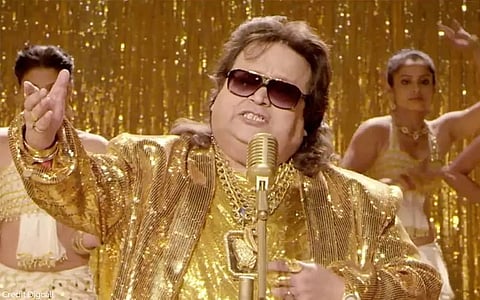
- Reviews
- Power List 2024
- Cannes 2024
- In-Depth Stories
- Web Stories
- News
- FC Lists
- Interviews
- Features
- FC SpecialsFC Specials

I grew up hearing and reading only uncomplimentary references to Alokesh aka Bappi Lahiri.
My father's generation had a sad shake of the head when they remembered his parents, Aparesh and Bansuri Lahiri, both singers in the classical mould. They sang 'modern Bengali songs' but the word 'modern' meant something totally different in the 1950s and 1960s.
My generation grew up during his most successful phase – the 1980s – but he seemed to be a bit of punching bag in the film fraternity. His pronounced Bengali accent, his chubby frame and his blingy look, all came in for a lot of flak. [I remember reading a filmi gossip item making fun of his pronunciation of Lata – 'Lotta' – and connecting it with an overweight comic book character called Little Lotta. Yeah, 'fat jokes' were a thing in the 80s.]
And of course, the sniggers about his 'lifts.' An alarming number of his hits seemed to have their origins in international hits, causing a flurry of jokes.
But if there was a hitmaker in the 1980s (and part of 1990s), it was Bappi Lahiri. Playing a field with veterans like RD Burman and Laxmikant-Pyarelal, he churned out one hit soundtrack after the other – becoming the undisputed 'Disco King', though his soulful tracks weren't pushovers either.
He composed a parade of beautiful numbers, melodious and soulful, making people do a double take when they saw the composer's name.
In the 1980s, Bengali cinema was making maudlin melodramas by the dozen, and at one point, I remember every loudspeaker in Calcutta playing songs from two superhit Bappi Lahiri soundtracks – Guru Dakshina (1987) and Amar Sangi (1986). The latter's 'Chirodini tumi je amar' was remade in Hindi as 'Dil mein ho tum.' A large part of my teen years was spent in jerking between the 'Songii amar songiiiiiii' chorus in Bengali and the 'Jaanuuuu meri jaanu' crescendo in Hindi! Guru Dakshina was as music-centric as a film could be because it was about a talented singer's sacrifice for his guru, with Bappi Lahiri's tunes propelling the story. Along with these two, the other surprise package from Lahiri's Bengali discography is Ogo Bodhu Shundori (1981), Uttam Kumar's last film and carrier of several cult songs. These three would easily be among most popular film soundtracks of 1980s Bengali cinema, though old-timers lamented that Aparesh Lahiri's son had gone rogue. The dancing youngsters on the streets hadn't figured it out, though.
The darling of dancing youngsters, Disco King, was just one avatar of Bappi Lahiri, though. Disco Dancer, Kasam Paida Karne Wale Ki, Dance Dance were the genre's canonical films here but every other film of his had a 'disco' number. Even the mostly serious family drama, Saaheb (1985), was spiced up by the rocking 'Yaar bina chain kahan re.' And 'Raat baaki baat baaki' and 'Jawaani jaaneman' (Namak Halaal) are two dance numbers that just send the dance floor afire.
Just as his disco avatar permeated his other films, the melody avatar went into disco films as well.
His second avatar was in partnership with Indeevar in films made in the South, famously starring Jeetendra. Himmatwala, Mawaali, Justice Chaudhury and the likes didn't win him any awards, but the combination of catchy music and inane lyrics had its share of earworms. Listen to 'Mamma mia pom pom' from Justice Chaudhury and you'll know what I mean. He composed these songs at the breakneck speed the films were being produced and delivered the goods. During this same period, he also had a prolific run in Telugu films.
There is also the third avatar – the Chalte Chalte Bappi Lahiri. The Sharaabi Bappi. The Aitbaar Bappi. He composed a parade of beautiful numbers, melodious and soulful, making people do a double take when they saw the composer's name. Sharaabi won Lahiri his only Filmfare award – though that year (1985), he had three nominations out of five. Some of his best songs from this phase involved KJ Yesudas, probably the last singer one would associate with Lahiri! Just as his disco avatar permeated his other films, the melody avatar went into disco films as well. Disco Dancer's 'Goron ki na kalon ki' is probably the Hindi song with the most international covers. Singers from Russia, East Europe, Africa and the Gulf countries have been sincerely singing this song for the last 40 years.
After a lifetime of being maligned, Bappi Lahiri had a second coming when the dancing youngsters of the 1980s and 1990s went places in the 2000s. One of the biggest hit remixes in the 2000s – 'Kaliyon ka chaman' – was a Lahiri original (from Jyoti) and made a star out of everyone involved. (Not to forget, Saregama and Lahiri sued Universal Music when they used a clip from this song in a track.) A Dharma production – the ultimate vehicle of aspiration in Bollywood – had a remix of his 1990s hit, 'Tamma tamma loge' (which became embroiled in controversy because *another* song – 'Jumma chumma de de' – was also copied from the same Mory Kante original). Adam Sandler in You Don't Mess With the Zohan grooved (actually, fought) to the tune of 'Jimmy Jimmy Jimmy aaja aaja aaja,' notwithstanding that there is another number it was inspired by. And Marvel – the global blockbuster factory – decided to promote their Guardians of the Galaxy Vol 2 with 'Jhoom jhoom jhoom baba.'
Maybe my children's generation will have a more indulgent view of Alokesh Lahiri.